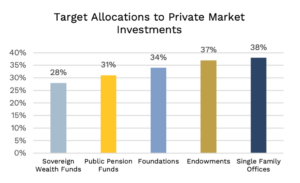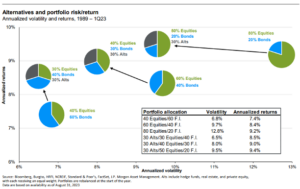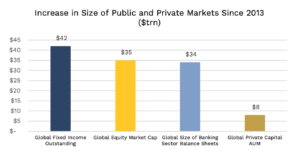Breaking Down Barriers: Private Markets Open their Doors to Individual Investors

Venture capital, growth equity, leveraged buyouts, private credit, and real assets.
The names themselves bring an air of exclusivity. These asset classes have been around for decades with well-established roles in institutional investment portfolios. However, for most of their existence, access has remained elusive for the average investor. Investing in private markets has been a club reserved for university endowments, pension plans, sovereign wealth funds, and the ultra-wealthy—until now.

Over the last decade there’s been a sea-change taking place in the industry. Large, institutionally focused private investment managers that once required minimum commitments of $10m+, have begun to develop cost-effective, investor-friendly structures that prioritize ease of access and appeal to individual investors. Which leads to the question, why now?
An ever-growing number of private equity firms are now publicly traded[1] and as a result, have become hyper focused on growing revenues. For a private investment manager to increase revenues they need to either raise more capital or generate higher investment returns. Generating above industry returns is hard. Instead, firms decided to build large internal teams to raise and manage retail capital with fund structures that offer low minimums (think $25-50k), attractive liquidity provisions (usually quarterly), and ease of use (no capital calls, 1099 tax reporting).

We think that opening access to high-quality private market managers has been a fantastic development for the industry. With thoughtful diligence and proper portfolio planning, individual investors can now build institutional-like portfolios with the potential to generate above market risk-adjusted returns.
Some investors are concerned that more money flowing into the space will dilute future return potential, which is a fair and necessary concern to address. Private market investment firms have received more than their fair share of headlines regarding the abundance of ‘dry powder’ on their books. However, context is key. There is undoubtedly more money in private funds than ever before, but compared to public markets, the growth appears quite measured. Paired with the fact that companies are staying private for longer and the number of publicly traded companies is in steady decline[2]we believe that having an allocation to private markets is a key element to consider for a globally diversified portfolio. Thankfully for the investors that want that exposure, what once seemed impossible, can now be a reality.

[1] Source: AMG Pantheon with data provided by Pitchbook and World Federation Exchange database as of March 31, 2023
[2] Source: S&P Global as of October 31, 2023
Please note: This material should not be considered a recommendation to buy or sell securities or a guarantee of future results. Curi Capital is a registered investment advisor. Registration does not imply a certain level of skill or training. More information about Curi Capital can be found in its Form ADV Part 2, which is available upon request.
Past performance is not a guarantee of future results. All investment strategies involve risk and have the potential for profit or loss; changes in investment strategies, contributions, or withdrawals may materially alter the performance and results of a portfolio. Different types of investments involve varying degrees of risk, and there can be no assurance that any specific investment will be suitable or profitable for a client’s investment portfolio. References to indexes and benchmarks are hypothetical illustrations of aggregate returns and do not reflect the performance of any actual investment. Investors cannot invest in an index and indexes do not reflect the deduction of the advisor’s fees or other trading expenses.



